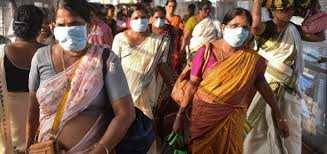Women affected adversely by Covid-19 pandemic!
By M.Y.Siddiqui
Gains made by women in their march to equality with men (gender justice) for over two centuries have been imperiled by the Covid-19 induced pandemic. Current pandemic has exposed vulnerability of women more than their male counterparts within their homes, labour market and as frontline healthcare workers. It has increased their unpaid work as caregivers, magnified pay disparities and widened the existing gender divide with its inequalities. More than men, roughly 740 million jobs in education, healthcare, food, retail services, social assistance and hospitality, known as preserve of women globally, have been lost during the lockdown. Despite lockdown having been eased considerably, many of women’s pink collared jobs largely worked by women are yet to resume normal operations, whereas the blue collared jobs that are generally men’s areas of work in manufacturing and construction have resumed full swing.
According to the World Health Organisation (WHO), in 104 countries women constitute 70 per cent of health and social works and are on the frontlines in the fight against Covid-19 and earn 11 per cent less than men with similar responsibilities. In India, the ASHA grassroots level healthcare workers draw a meagre salary of 3000 per month. Many have no access to sanitizers, masks and PPE, the Personal Protective Equipment as most of these are made to fit men. The stipulation for home care for many Covid-19 patients has increased women’s burden and put them at greater risks of getting infected. Furthermore, the diversion of critical resources to fight the pandemic has seen an increase in maternal morbidity, adolescent pregnancy, HIV transmission and sexually transmitted diseases.
The International Labour Organisation (ILO) estimates, women perform 76.2 per cent of total hours of unpaid care work, more than three times as much as men and this figure rises up to 80 per cent in the Asia Pacific region. Though essential, women are underpaid and undervalued. Women in non-essential work like retail sectors and women with lower skills are more likely to lose their jobs. During India’s several lockdowns, four out of ten women who were working during last year have lost their jobs. Women in rural areas are among the hardest hit. The biggest decline in employment has been among Scheduled Castes, 36 per cent as compared to 23 per cent among the upper castes. Despite easing of restrictions domestic helps, predominantly women, are prohibited in many residential areas as they are considered to be super spreaders.
As per a report of UNESCO, women’s child care responsibilities have increased in view of closing of childcare centres and schools due to total lockdowns. Medical professionals and healthcare workers, on duty too, have no access to childcare facilities. As schools and crèches are yet to open, many women perhaps would delay returning to the labour market and for some it could also mean that they might have to stay at home by default as caregivers for young children, ageing parents and relatives at home. Women could also end up at home as they are the ones who earn less. Mothers did 1.7 more hours doing house work than fathers and 2.3 more hours than fathers taking care of children.
Less educated women find the new normal tough as they have to combine their jobs with extra childcare responsibilities. Many fear regression of society to 1950s way of living with women ready to return to work but unable to do so in the absence of affordable childcare. Lockdown has multiplied motherhood penalty, which will ultimately reverse decades of progress on women’s participation in the labour market unless the government intervenes to address it. There is thus need for retraditionalisation of roles and work towards giving women and men the same opportunities. That would enable mothers to pick up jobs to get time to be with their children. An alarming number of women and girls between 25 per cent and 30 per cent face increase in domestic violence as they are trapped in their homes with the abuser, who takes advantage of women’s inability to seek help or escape. Women suffer silently for the fear of being thrown out or nowhere to go.
Covid-19 induced pandemic has deepened women’s problems and enhanced their vulnerabilities. Gender inequalities ought to be addressed alongside other inequalities in a common political space. Lockdown is a stressful time. Homes are becoming battle grounds and disagreements getting bigger and bitter. A large number of women across different countries are facing numerous problems. Both national and international initiatives are needed to mitigate these. Without such initiatives, major areas of human development would regress which in turn would inevitably lead to drastic decline in any country’s progress!
Powered by Froala Editor




LEAVE A REPLY